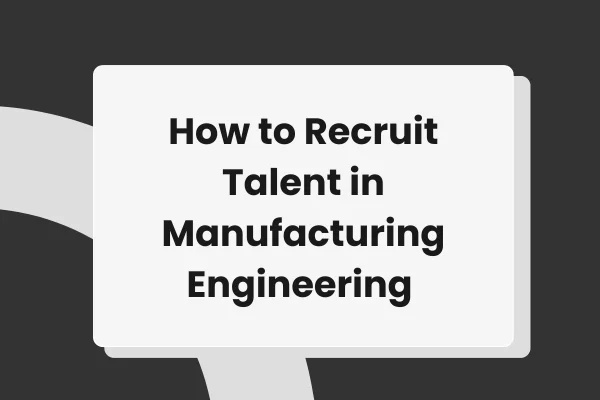
How to recruit talent in manufacturing engineering
Hiring the right talent in manufacturing engineering is a constant challenge for many businesses. The sector demands highly skilled professionals who can improve efficiency, optimise processes, and contribute to long-term growth. Yet many industrial manufacturing companies struggle to find the time and resources to manage recruitment effectively in-house. Understanding how to approach manufacturing engineering recruitment with a structured strategy can make the difference between prolonged vacancies and securing the right candidate who will add real value.
Recruitment in this space requires a clear definition of the role, an attractive value proposition, effective sourcing methods, and a streamlined selection process. It also involves offering competitive packages and considering specialist support when internal teams are stretched. Below, we outline the best practices that can help businesses succeed in hiring manufacturing engineers.
Why manufacturing engineering recruitment is critical
Manufacturing engineers sit at the centre of industrial production. They ensure processes are efficient, safe, and cost-effective while maintaining quality standards. Whether focused on process design, automation, or continuous improvement, their work has a direct impact on productivity and profitability.
When these positions remain unfilled, operations can slow down, project deadlines may be missed, and existing teams face additional pressure. This is why businesses in industrial manufacturing must treat recruitment as a strategic priority rather than an administrative task.
Define the role precisely
A major barrier to successful recruitment is an unclear job description. “Manufacturing engineer” can mean different things in different contexts. For some firms, the focus is on process improvement and lean manufacturing. Others prioritise mechanical design, quality assurance, or automation and controls.
When hiring, start by clarifying the exact responsibilities of the position. Does the role involve working on new product introductions, scaling up production, implementing automation, or driving cost-efficiency initiatives? Once these tasks are identified, map out the technical skills required, such as CAD proficiency, knowledge of production systems, or expertise in Six Sigma methodologies.
Beyond technical ability, consider the behaviours and soft skills that will help a candidate succeed. Strong communication, problem-solving, and collaboration skills are essential in environments where cross-functional teams must work closely to deliver results. By defining both the technical and behavioural requirements, you give yourself the best chance of attracting candidates who align with your business needs.
Build a strong employer value proposition
Recruitment is not only about assessing candidates. It is also about convincing high-calibre engineers that your company is the right place to build their career. An employer value proposition sets out why professionals should choose your business over competitors.
In manufacturing engineering, many candidates are motivated by the opportunity to work on advanced technology, impactful projects, and tangible improvements to processes. Highlighting the scale of your operations, the systems you use, and your commitment to innovation can be persuasive. Career progression also matters. Engineers want to see a clear path for growth, whether through project leadership, management opportunities, or specialist technical tracks.
From a branding perspective, industrial manufacturing companies that share their achievements and investment in areas like automation, engineered materials, or smart manufacturing are more attractive. As Mackinnon Bruce outlines in its industrial manufacturing focus, sectors such as industrial machinery, fluid control, and material handling are advancing quickly. Businesses that showcase involvement in these areas are more likely to capture candidate interest.
Manufacturing engineer recruitment strategies
Use specialist recruitment networks
Finding the right candidates requires more than posting on job boards. Many of the strongest manufacturing engineers are not actively searching for roles but may be open to the right opportunity if approached. This is where specialist sourcing strategies are critical.
Recruitment partners who understand industrial manufacturing can give businesses an advantage by accessing established talent networks. Mackinnon Bruce, for example, works across engineered materials, industrial machinery, smart manufacturing, and related areas, meaning they can engage candidates who already have the relevant industry experience.
Engage with industry associations and events
Employers can also build pipelines by working with professional engineering associations, attending trade shows, and sponsoring industry events. These forums create opportunities to connect with engineers directly and strengthen employer brand visibility.
Tap into referrals and passive candidates
Referral schemes within your organisation can be effective, as current employees often know skilled professionals in their networks. Passive candidate outreach is another valuable tactic. Skilled recruiters use market mapping and direct engagement to approach individuals who may not be applying for jobs but are open to discussion. This helps broaden the talent pool and shortens the time to hire.
Assessment and selection in manufacturing recruitment
Once candidates are identified, the next step is ensuring that the assessment process identifies the strongest fit. Manufacturing engineers need to combine technical expertise with practical application. A thorough selection process typically includes a mix of technical tests, problem-solving case studies, and structured interviews.
Practical assessments allow candidates to demonstrate how they would approach a real-world challenge, such as optimising a production line or addressing quality issues. Interviews should also test behavioural competencies, including adaptability, teamwork, and communication. These qualities are particularly important when engineers are expected to collaborate with design, operations, and supply chain functions.
Finally, cultural fit cannot be overlooked. A candidate may have the right technical background but may not thrive in your specific environment if they cannot adapt to your pace, safety standards, or operational goals. Building these considerations into your process reduces the likelihood of costly hiring mistakes.
Speed, transparency, and candidate experience
Even when the right candidates are identified, businesses often lose them because of delays or poor communication. Manufacturing engineers are in high demand, and top candidates are likely to receive multiple offers. Employers who move quickly and maintain transparent communication have a greater chance of securing the hire.
Make sure your recruitment process is efficient. Limit unnecessary interview rounds, provide feedback promptly, and communicate clear timelines. Respecting candidates’ time not only improves their perception of your business but also demonstrates professionalism. Even if a candidate is not selected, treating them well helps build your reputation in the market.
Compensation, retention, and career development
To hire and retain strong engineers, compensation needs to be competitive. Salary benchmarks should be reviewed regularly to ensure your offers reflect the market. Benefits such as bonuses, healthcare, and pension contributions also play a part.
Retention, however, depends on more than pay. Manufacturing engineers value opportunities for training, exposure to modern technologies, and involvement in challenging projects. Employers who can show commitment to professional development and clear career paths are more likely to retain candidates.
This is particularly important in industries experiencing rapid change in areas such as smart manufacturing and industrial automation. Engineers want to be part of forward-thinking businesses that invest in technology and people.
When to partner with a recruitment agency
Many businesses recognise that managing recruitment entirely in-house is not practical. Internal HR teams may lack the specialist market knowledge or the time required to source, screen, and assess candidates effectively. In these cases, working with a specialist recruitment partner can deliver stronger outcomes.
Agencies that focus on manufacturing engineering recruitment bring sector knowledge, access to networks, and the ability to present pre-qualified candidates quickly. Mackinnon Bruce offers services such as market mapping, salary benchmarking, succession planning, and executive search, helping clients secure candidates across engineered materials, material handling, fluid control, and other industrial manufacturing areas.
By establishing a clear partnership with defined objectives and regular communication, businesses can reduce hiring times, improve candidate quality, and ensure recruitment aligns with long-term goals.
Hiring manufacturing engineers is a complex task, but with the right approach, businesses can significantly improve outcomes. Clear role definition, a strong employer value proposition, targeted sourcing, effective assessment, and a streamlined process all contribute to success. Competitive compensation and a focus on retention ensure that the engineers you bring in will stay and contribute to long-term goals. For companies without the internal resources to manage every stage, specialist recruitment partners provide valuable expertise and market reach.
To learn more about the industrial sectors we recruit in and to view current opportunities, visit our Industrial Manufacturing page.




